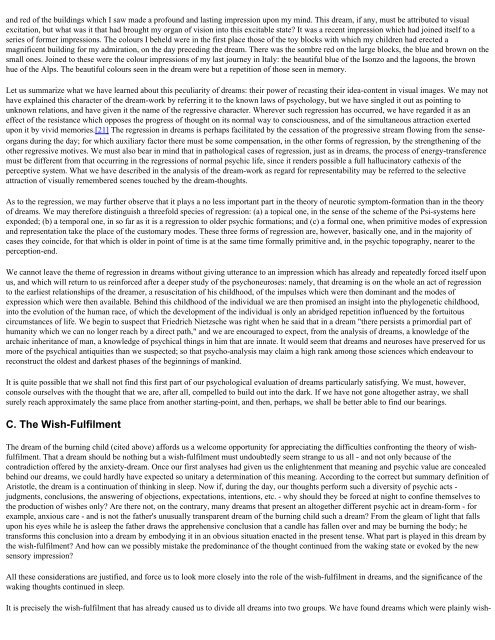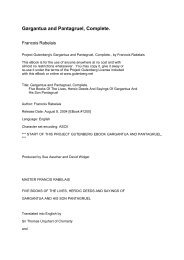The Interpretation of Dreams Sigmund Freud (1900)
The Interpretation of Dreams Sigmund Freud (1900)
The Interpretation of Dreams Sigmund Freud (1900)
Create successful ePaper yourself
Turn your PDF publications into a flip-book with our unique Google optimized e-Paper software.
and red <strong>of</strong> the buildings which I saw made a pr<strong>of</strong>ound and lasting impression upon my mind. This dream, if any, must be attributed to visual<br />
excitation, but what was it that had brought my organ <strong>of</strong> vision into this excitable state? It was a recent impression which had joined itself to a<br />
series <strong>of</strong> former impressions. <strong>The</strong> colours I beheld were in the first place those <strong>of</strong> the toy blocks with which my children had erected a<br />
magnificent building for my admiration, on the day preceding the dream. <strong>The</strong>re was the sombre red on the large blocks, the blue and brown on the<br />
small ones. Joined to these were the colour impressions <strong>of</strong> my last journey in Italy: the beautiful blue <strong>of</strong> the Isonzo and the lagoons, the brown<br />
hue <strong>of</strong> the Alps. <strong>The</strong> beautiful colours seen in the dream were but a repetition <strong>of</strong> those seen in memory.<br />
Let us summarize what we have learned about this peculiarity <strong>of</strong> dreams: their power <strong>of</strong> recasting their idea-content in visual images. We may not<br />
have explained this character <strong>of</strong> the dream-work by referring it to the known laws <strong>of</strong> psychology, but we have singled it out as pointing to<br />
unknown relations, and have given it the name <strong>of</strong> the regressive character. Wherever such regression has occurred, we have regarded it as an<br />
effect <strong>of</strong> the resistance which opposes the progress <strong>of</strong> thought on its normal way to consciousness, and <strong>of</strong> the simultaneous attraction exerted<br />
upon it by vivid memories.[21] <strong>The</strong> regression in dreams is perhaps facilitated by the cessation <strong>of</strong> the progressive stream flowing from the senseorgans<br />
during the day; for which auxiliary factor there must be some compensation, in the other forms <strong>of</strong> regression, by the strengthening <strong>of</strong> the<br />
other regressive motives. We must also bear in mind that in pathological cases <strong>of</strong> regression, just as in dreams, the process <strong>of</strong> energy-transference<br />
must be different from that occurring in the regressions <strong>of</strong> normal psychic life, since it renders possible a full hallucinatory cathexis <strong>of</strong> the<br />
perceptive system. What we have described in the analysis <strong>of</strong> the dream-work as regard for representability may be referred to the selective<br />
attraction <strong>of</strong> visually remembered scenes touched by the dream-thoughts.<br />
As to the regression, we may further observe that it plays a no less important part in the theory <strong>of</strong> neurotic symptom-formation than in the theory<br />
<strong>of</strong> dreams. We may therefore distinguish a threefold species <strong>of</strong> regression: (a) a topical one, in the sense <strong>of</strong> the scheme <strong>of</strong> the Psi-systems here<br />
exponded; (b) a temporal one, in so far as it is a regression to older psychic formations; and (c) a formal one, when primitive modes <strong>of</strong> expression<br />
and representation take the place <strong>of</strong> the customary modes. <strong>The</strong>se three forms <strong>of</strong> regression are, however, basically one, and in the majority <strong>of</strong><br />
cases they coincide, for that which is older in point <strong>of</strong> time is at the same time formally primitive and, in the psychic topography, nearer to the<br />
perception-end.<br />
We cannot leave the theme <strong>of</strong> regression in dreams without giving utterance to an impression which has already and repeatedly forced itself upon<br />
us, and which will return to us reinforced after a deeper study <strong>of</strong> the psychoneuroses: namely, that dreaming is on the whole an act <strong>of</strong> regression<br />
to the earliest relationships <strong>of</strong> the dreamer, a resuscitation <strong>of</strong> his childhood, <strong>of</strong> the impulses which were then dominant and the modes <strong>of</strong><br />
expression which were then available. Behind this childhood <strong>of</strong> the individual we are then promised an insight into the phylogenetic childhood,<br />
into the evolution <strong>of</strong> the human race, <strong>of</strong> which the development <strong>of</strong> the individual is only an abridged repetition influenced by the fortuitous<br />
circumstances <strong>of</strong> life. We begin to suspect that Friedrich Nietzsche was right when he said that in a dream "there persists a primordial part <strong>of</strong><br />
humanity which we can no longer reach by a direct path," and we are encouraged to expect, from the analysis <strong>of</strong> dreams, a knowledge <strong>of</strong> the<br />
archaic inheritance <strong>of</strong> man, a knowledge <strong>of</strong> psychical things in him that are innate. It would seem that dreams and neuroses have preserved for us<br />
more <strong>of</strong> the psychical antiquities than we suspected; so that psycho-analysis may claim a high rank among those sciences which endeavour to<br />
reconstruct the oldest and darkest phases <strong>of</strong> the beginnings <strong>of</strong> mankind.<br />
It is quite possible that we shall not find this first part <strong>of</strong> our psychological evaluation <strong>of</strong> dreams particularly satisfying. We must, however,<br />
console ourselves with the thought that we are, after all, compelled to build out into the dark. If we have not gone altogether astray, we shall<br />
surely reach approximately the same place from another starting-point, and then, perhaps, we shall be better able to find our bearings.<br />
C. <strong>The</strong> Wish-Fulfilment<br />
<strong>The</strong> dream <strong>of</strong> the burning child (cited above) affords us a welcome opportunity for appreciating the difficulties confronting the theory <strong>of</strong> wishfulfilment.<br />
That a dream should be nothing but a wish-fulfilment must undoubtedly seem strange to us all - and not only because <strong>of</strong> the<br />
contradiction <strong>of</strong>fered by the anxiety-dream. Once our first analyses had given us the enlightenment that meaning and psychic value are concealed<br />
behind our dreams, we could hardly have expected so unitary a determination <strong>of</strong> this meaning. According to the correct but summary definition <strong>of</strong><br />
Aristotle, the dream is a continuation <strong>of</strong> thinking in sleep. Now if, during the day, our thoughts perform such a diversity <strong>of</strong> psychic acts -<br />
judgments, conclusions, the answering <strong>of</strong> objections, expectations, intentions, etc. - why should they be forced at night to confine themselves to<br />
the production <strong>of</strong> wishes only? Are there not, on the contrary, many dreams that present an altogether different psychic act in dream-form - for<br />
example, anxious care - and is not the father's unusually transparent dream <strong>of</strong> the burning child such a dream? From the gleam <strong>of</strong> light that falls<br />
upon his eyes while he is asleep the father draws the apprehensive conclusion that a candle has fallen over and may be burning the body; he<br />
transforms this conclusion into a dream by embodying it in an obvious situation enacted in the present tense. What part is played in this dream by<br />
the wish-fulfilment? And how can we possibly mistake the predominance <strong>of</strong> the thought continued from the waking state or evoked by the new<br />
sensory impression?<br />
All these considerations are justified, and force us to look more closely into the role <strong>of</strong> the wish-fulfilment in dreams, and the significance <strong>of</strong> the<br />
waking thoughts continued in sleep.<br />
It is precisely the wish-fulfilment that has already caused us to divide all dreams into two groups. We have found dreams which were plainly wish-









